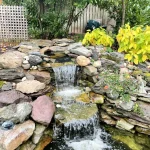Have you ever wondered how long it takes for a pond to freeze completely during the winter season? The freezing process of a pond can be influenced by various factors such as temperature, pond size, and weather conditions. Let’s explore the factors that affect the freezing time of a pond and how long it generally takes for a pond to freeze.
Factors Affecting Pond Freezing Time
Several factors play a significant role in determining how quickly a pond freezes:
- Temperature: The primary factor that affects the freezing time of a pond is the temperature. The lower the temperature, the faster the pond will freeze. Consistently cold temperatures will expedite the freezing process.
- Pond Size: The size of the pond also influences how long it takes to freeze. Larger ponds will take longer to freeze compared to smaller ponds due to the volume of water that needs to reach the freezing point.
- Depth: The depth of the pond plays a crucial role in freezing time. Deeper ponds will take longer to freeze as the deeper layers of water retain heat for a more extended period, slowing down the freezing process.
- Weather Conditions: Weather conditions such as wind and sunlight can impact the freezing time of a pond. Wind can accelerate the freezing process by reducing the insulating layer of snow on the surface, while sunlight can slow down freezing by providing some warmth.

Credit: lakeice.squarespace.com
General Timeframe for Pond Freezing
While the time it takes for a pond to freeze can vary based on the factors mentioned above, a general timeframe can be estimated:
| Pond Size | Estimated Freezing Time |
|---|---|
| Small Pond | 1-2 days |
| Medium Pond | 3-5 days |
| Large Pond | 1-2 weeks |
It is important to note that these are general estimates, and the actual freezing time can vary based on the specific conditions of the pond and its surroundings.
Implications of Pond Freezing
When a pond freezes over completely, it can have various implications on the ecosystem:
- Effect on Aquatic Life: The freezing of a pond can impact the aquatic life within it. Fish and other organisms may struggle to survive in frozen waters, affecting the ecosystem.
- Impact on Water Quality: The freezing of a pond can lead to changes in water quality. Ice cover can limit oxygen exchange, potentially leading to poor water quality.
- Recreation: Frozen ponds can provide opportunities for recreational activities such as ice skating and ice fishing, offering a different experience for outdoor enthusiasts.
Tips for Maintaining a Frozen Pond
If you have a pond on your property and want to maintain a frozen surface, here are some tips:
- Clear Snow: Clearing snow from the surface of the pond can help accelerate the freezing process by allowing the water to cool more efficiently.
- Block Wind: Creating windbreaks around the pond can help prevent wind from disrupting the ice formation process.
- Limit Sun Exposure: Minimize sunlight exposure on the pond to prevent the ice from melting prematurely.
- Monitor Water Quality: Regularly check the water quality of the pond to ensure the well-being of any aquatic life present.

Credit: myfishingpartner.com
Conclusion
In conclusion, the time it takes for a pond to freeze can vary based on factors such as temperature, pond size, depth, and weather conditions. While smaller ponds may freeze within a few days, larger ponds can take up to a couple of weeks to freeze completely. Understanding the factors that influence pond freezing and taking steps to maintain a frozen surface can help you make the most of this natural phenomenon during the winter season.



